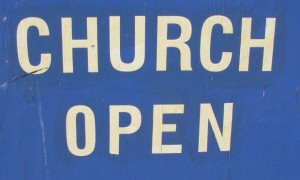 WASHINGTON — The U.S. Supreme Court has unanimously ruled in favor of an Arizona church and against a local law that essentially forced churches to display their signs at night, while allowing other types of signs to be displayed 24/7.
WASHINGTON — The U.S. Supreme Court has unanimously ruled in favor of an Arizona church and against a local law that essentially forced churches to display their signs at night, while allowing other types of signs to be displayed 24/7.
As previously reported, in 2008, Good News Community Church of Gilbert filed a lawsuit in federal court seeking to obtain an injunction against the city’s sign ordinance, which prohibited entities from displaying temporary directional signs on the public ways more than 12 hours before services and more than 1 hour afterward.
The church had found itself in disputes with the city prior to filing the suit, as officials claimed that members were displaying too many signs and was leaving them up for too long. A directional sign is a sign with an arrow, pointing traffic to a particular event or location.
Few time limitations are placed on political signs, and none at all on ideological signs—that is, a sign with a general message regarding a particular issue or subject matter. Therefore, the church advised the court that the ordinance is unbalanced and overly-burdened its desire to advertise its services out of the Bible’s command to “make disciples of all nations.”
During the initial proceedings in 2009, the district court refused to grant the injunction, seeing no problem with the requirement. The case then escalated to the 9th Circuit Court of Appeals, which ruled that there was no constitutional infirmity with the ordinance because it is “a content-neutral regulation” and “does not impermissibly favor commercial speech over noncommercial speech.”
However, the three-judge panel was divided as Judge Paul Watford opined that the ordinance violated the First and Fourteenth Amendments to the United States Constitution. He noted that since church services begin at 9 a.m., and the signs may only be erected 12 hours prior to the service, the signs would have to go up at 9 p.m. and remain through the dark of night, when no one could see them.
Watford found the requirement in this instance to be glaringly problematic—especially in light of the fact that political and ideological signs were not subject to similar limitations.
The case was then appealed to the U.S. Supreme Court, and on Thursday, the court unanimously agreed with Watford, declaring the ordinance to be unconstitutional because it favored political and ideological signs over church and other non-profit signs.
“[A]n innocuous justification cannot transform a facially content-based law into one that is content neutral,” the justices wrote. “Innocent motives do not eliminate the danger of censorship presented by a facially content-based statute, as future government officials may one day wield such statutes to suppress disfavored speech.”
“That is why the First Amendment expressly targets the operation of the laws—i.e., the ‘abridg[ement] of speech’—rather than merely the motives of those who enacted them,” the ruling continued.
Alliance Defending Freedom (ADF), which represented Good News Community Church before the court, applauded the decision.
“The Supreme Court’s unanimous ruling is a victory for everyone’s freedom of speech,” said ADF Senior Counsel David Cortman in a statement. “Speech discrimination is wrong regardless of whether the government intended to violate the First Amendment or not, and it doesn’t matter if the government thinks its discrimination was well-intended. It’s still [the] government playing favorites, and that’s unconstitutional.”
“This whole experience has been shocking to me,” Clyde Reed, 82, pastor of Good News Community Church stated earlier this year following oral argument before the court. “Our signs inviting people to church are very important yet are treated as second-class speech. We aren’t asking for special treatment; we just want our town to stop favoring the speech of others over ours.”
Become a Christian News Network Supporter...


